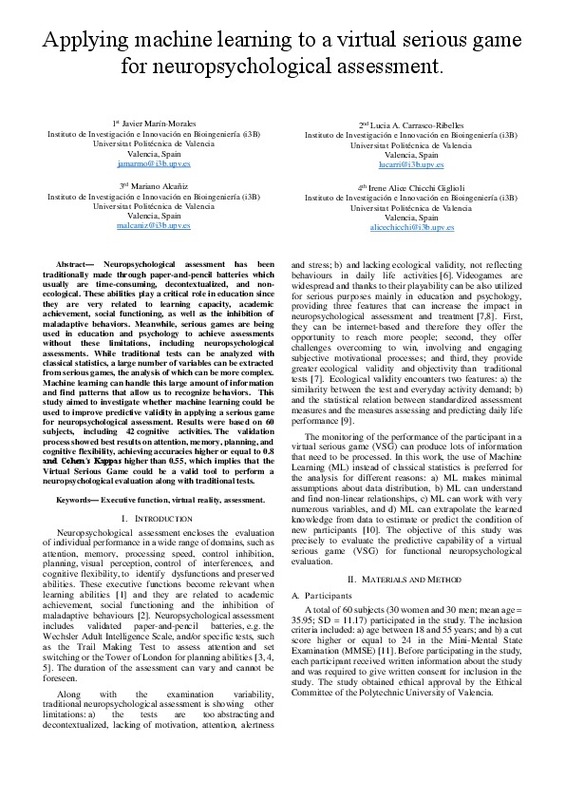JavaScript is disabled for your browser. Some features of this site may not work without it.
Buscar en RiuNet
Listar
Mi cuenta
Estadísticas
Ayuda RiuNet
Admin. UPV
Applying machine learning to a virtual serious game for neuropsychological assessment.
Mostrar el registro sencillo del ítem
Ficheros en el ítem
| dc.contributor.author | Marín-Morales, Javier
|
es_ES |
| dc.contributor.author | Carrasco-Ribelles, Lucia A.
|
es_ES |
| dc.contributor.author | Alcañiz Raya, Mariano Luis
|
es_ES |
| dc.contributor.author | CHICCHI-GIGLIOLI, IRENE ALICE
|
es_ES |
| dc.date.accessioned | 2021-11-17T08:07:52Z | |
| dc.date.available | 2021-11-17T08:07:52Z | |
| dc.date.issued | 2021-04-23 | es_ES |
| dc.identifier.issn | 2165-9567 | es_ES |
| dc.identifier.uri | http://hdl.handle.net/10251/177195 | |
| dc.description.abstract | [EN] Neuropsychological assessment has been traditionally made through paper-and-pencil batteries which usually are time-consuming, decontextualized, and nonecological. These abilities play a critical role in education since they are very related to learning capacity, academic achievement, social functioning, as well as the inhibition of maladaptive behaviors. Meanwhile, serious games are being used in education and psychology to achieve assessments without these limitations, including neuropsychological assessments. While traditional tests can be analyzed with classical statistics, a large number of variables can be extracted from serious games, the analysis of which can be more complex. Machine learning can handle this large amount of information and find patterns that allow us to recognize behaviors. This study aimed to investigate whether machine learning could be used to improve predictive validity in applying a serious game for neuropsychological assessment. Results were based on 60 subjects, including 42 cognitive activities. The validation process showed best results on attention, memory, planning, and cognitive flexibility, achieving accuracies higher or equal to 0.8 and Cohen¿s Kappas higher than 0.55, which implies that the Virtual Serious Game could be a valid tool to perform a neuropsychological evaluation along with traditional tests. | es_ES |
| dc.description.sponsorship | This work was supported by the Spanish Ministry of Economy, Industry and Competitiveness funded project Advanced Therapeutically Tools for Mental Health (DPI2016-77396-R) and by the European Union through the Operational Program of the European Regional Development Fund (ERDF) on the Valencian Community 2010-2020 (IDIFEDER/2018/029). | es_ES |
| dc.language | Inglés | es_ES |
| dc.publisher | IEEE | es_ES |
| dc.relation.ispartof | Proceedings of the 2021 IEEE Global Engineering Education Conference (EDUCON) | es_ES |
| dc.relation.ispartofseries | IEEE Global Engineering Education Conference | es_ES |
| dc.rights | Reserva de todos los derechos | es_ES |
| dc.subject | Executive function | es_ES |
| dc.subject | Virtual reality | es_ES |
| dc.subject | Assessment | es_ES |
| dc.subject.classification | ESTADISTICA E INVESTIGACION OPERATIVA | es_ES |
| dc.subject.classification | EXPRESION GRAFICA EN LA INGENIERIA | es_ES |
| dc.title | Applying machine learning to a virtual serious game for neuropsychological assessment. | es_ES |
| dc.type | Comunicación en congreso | es_ES |
| dc.type | Artículo | es_ES |
| dc.identifier.doi | 10.1109/EDUCON46332.2021.9454138 | es_ES |
| dc.relation.projectID | info:eu-repo/grantAgreement/GVA//IDIFEDER%2F2018%2F029//INTERFACES DE REALIDAD MIXTA APLICADA A SALUD Y TOMA DE DECISIONES/ | es_ES |
| dc.relation.projectID | info:eu-repo/grantAgreement///DPI2016-77396-R//HERRAMIENTAS TERAPEUTICAS AVANZADAS PARA SALUD MENTAL/ | es_ES |
| dc.rights.accessRights | Abierto | es_ES |
| dc.contributor.affiliation | Universitat Politècnica de València. Instituto Interuniversitario de Investigación en Bioingeniería y Tecnología Orientada al Ser Humano - Institut Interuniversitari d'Investigació en Bioenginyeria i Tecnologia Orientada a l'Ésser Humà | es_ES |
| dc.contributor.affiliation | Universitat Politècnica de València. Departamento de Ingeniería Gráfica - Departament d'Enginyeria Gràfica | es_ES |
| dc.description.bibliographicCitation | Marín-Morales, J.; Carrasco-Ribelles, LA.; Alcañiz Raya, ML.; Chicchi-Giglioli, IA. (2021). Applying machine learning to a virtual serious game for neuropsychological assessment. IEEE. 951-954. https://doi.org/10.1109/EDUCON46332.2021.9454138 | es_ES |
| dc.description.accrualMethod | S | es_ES |
| dc.relation.conferencename | IEEE Global Engineering Education Conference (EDUCON 2021) | es_ES |
| dc.relation.conferencedate | Abril 21-23,2021 | es_ES |
| dc.relation.conferenceplace | Online | es_ES |
| dc.relation.publisherversion | https://doi.org/10.1109/EDUCON46332.2021.9454138 | es_ES |
| dc.description.upvformatpinicio | 951 | es_ES |
| dc.description.upvformatpfin | 954 | es_ES |
| dc.type.version | info:eu-repo/semantics/publishedVersion | es_ES |
| dc.relation.pasarela | S\438085 | es_ES |
| dc.contributor.funder | Generalitat Valenciana | es_ES |
| dc.contributor.funder | European Regional Development Fund | es_ES |







![[Cerrado]](/themes/UPV/images/candado.png)

